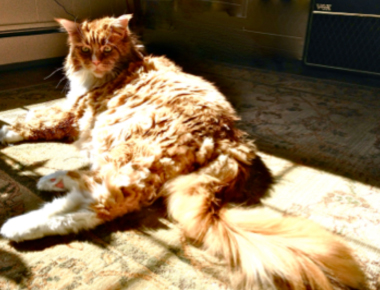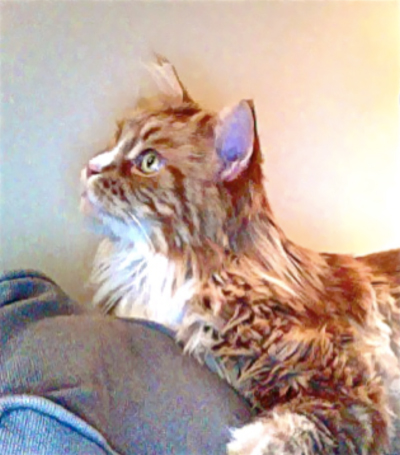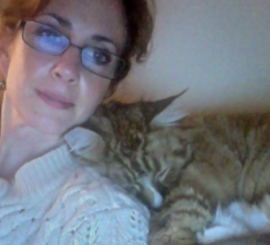When I saw him, he was asleep on a bed of autumn leaves. Sugar maple and oak, I think. His strawberry-blond head glowed like native honey in the mid-afternoon sun. He was stretched out long and laying on his side. For a moment, I watched the rise and fall of breath in his body; the rhythm eased me, inhale by exhale, into my own body and breath, where I felt myself gradually come to rest in the space behind my belly button.
Leaves and twigs crunched and snapped beneath my feet, as I closed the space between us with a few ginger steps. I lowered myself to the ground and lay down beside him, spooning from behind, my chest and belly curved to his back. I placed my right arm across his body, tentative, gentle, wanting him to know I was there, yet not wishing to disturb his rest.
Beneath the sweet scent of new fallen leaves I could smell the earth, and the musty aroma of an older layer of foliage that had begun to decay. Above us, the sun played upon a full canopy, suffusing the air around us with a rosy hue.
I pressed my face to the back of his head and inhaled full and deep, gradually syncing my breath with his. He was warm and soft and solid. With each exhale, I imagined emptying all my adoration into him through the narrow space between his shoulders.
After a few moments, he stirred, and then turned to face me. Following his lead, I enfolded him, first with my arms and then my legs. He leaned in, and eyes closed, I felt him press his brow to mine.
In this embrace, I felt a deep, secret connection. As we held each other heart to heart, time and words were of no use or consequence. I felt ecstatic and utterly at peace.
I could still feel the weight and shape of his body when I awoke to find it was a dream. The sweet glow of mutual adoration lingered for a moment or two before giving way to discomfort edged with shame. The one who held me with such tenderness was not my husband. It was Duncan, my cat.
Such a sensual exchange between human and animal felt a little dangerous, maybe even illicit. The roots of my Roman Catholic childhood woke and stirred in my belly: was it wrong to enter into such an intimate embrace with an animal? Unnatural? This was not, after all, the simple, playful affection of a woman toward her pet. Neither was it an anthropomorphized embrace between human “mother” and animal “child”. What transpired with Duncan felt like a deep, almost mystical exchange between equals, like the meeting of two souls.

Duncan. Regal and self-possessed, his green-gold eyes registered everything. When he held me in his gaze, I felt emotionally bare, my thoughts and feelings transparent as water. Duncan, whose thirty-three pounds of presence belied a disposition so gentle and kind it made us weak in the knees. He was not much of a climber, not much of a mover at all, so it was my habit – as well as my need, and my pleasure, if I am being honest— to drop to my knees, thread my fingers through the silky white ruff at his throat, to bathe his head and cheeks in kisses before sinking all the way down to enfold him, my belly to his back. Once there, I would tuck his head under my chin, or nuzzle the back of his head, allowing my breath to attune to his. His purr was a symphony of low bass notes threaded through with complex harmonics, a soft, bell-like trill at the top. It was music, and it was medicine – medicine best taken in the closest proximity to its source that one could manage.
When my husband found Duncan, he did not think it right to move him before I saw him. His body was cooling by the time I arrived.
My knees once again went weak as my gaze came to rest on his body in repose, but this time, it was with shock and sorrow. Just two hours earlier, he had purred when I kissed him goodbye before leaving to meet a friend for coffee.
He was stretched out long, lying on his side, in the same position as the opening of the dream. His hips and hind legs were on his favorite blue mat, while the rest of him was on the hardwood floor. It might as well have been cement; I prayed that by the time his ear reached the ground he was gone, for there were no leaves to cushion his fall.
The breath I loved to watch rise and fall beneath his honey-colored coat had left him. His bladder had emptied, and his mouth was open — perhaps in surprise —his cheek and chin wet with saliva. His green-gold eyes were partially open, and unlike humans, it’s almost impossible to close a cat’s eyelids after death.
Even with the life gone out of him, I could not resist the urge to touch him, to pour all my love into him. I sunk to my knees, then turned myself to curl my chest and belly against his back for the last time. Sobbing into his neck, I could still smell the flowery shampoo the groomer had used on him a month earlier. Each of his great paws was nearly as large as my palm. I took his right front paw in my hand and massaged it, feeling the smooth pads, once petal pink, now leeched of their color. I stroked the long, silky fur between his toes, and I allowed my heart to break.
Once I had gathered myself enough to do so, I filled a bowl with warm soapy water. I thought of my elder women friends who have bathed the bodies of their loved ones immediately after death. I washed the saliva from his face, noticing that his tongue had taken on a lavender hue and lay to one side of his mouth. When I leaned in close to kiss him and whisper my love, I could smell the kibbles he ate for breakfast and a faint briny-ness beneath. I cleaned between his stiffening legs and beneath his tail. As I worked, I recalled the times he had trusted me enough to be utterly vulnerable with me: clipping mats from his belly and private places, helping him get clean after an “accident” that was too much for him to manage on his own. When I was done, I dried him with a towel. Without his breath rising to meet my hands upon him, without the whimpers and groans and occasional growl to let me know I was entering sensitive territory and should tread cautiously, without his purr to keep both of us calm, I almost felt as though I didn’t know this version of Duncan. And yet, I had cared for this body since it was twelve weeks old, nurtured it and watched it grow, along with the intelligence and spirit that had inhabited it.

It has been five years since I dreamed of embracing Duncan, and five months since he died. I went back to the dream in hopes that it would open my heart to grieving him more fully, and it did. Yet I could not revisit it without also revisiting the sense of shame I felt upon waking from it. What was that about? I’ve been wrestling this, dancing around it, distracting myself from it, sanitizing it, knowing that going there means diving deep into a sea of divisions that exist within me: between my mind and my body, between my body and nature, between humans and animals, domestication and wildness, control and impulse— the list is long and daunting, and knotted up with shame.
I consider my statement that the dream embrace was “like a meeting of equals” and wonder what needs to change in order to say, “it was a meeting of equals”? I believe it would require me to acknowledge and own my animal nature – not theoretically, but in my body.
And so, is the dream (also) an invitation to remember and reclaim my animal body? The body that navigates the world and each moment by instinct and urge, sense and sensation, where the thinking mind and all its notions of and taboos about “the other” drop away and communing between species becomes possible in waking life as well as in dreams?
I do not know how to traverse this divide. The prospect of it excites and frightens me. I wonder who and what might emerge from my rather prim and civilized persona if I were able to throw off the chains and layers of convention to find out. Who, then, would turn to meet Duncan in that intimate embrace?
About the Author

Kristin Flyntz lives in northern Connecticut with her husband and Ophelia and Zoe, two feline companions and teachers.
Return to top